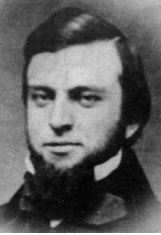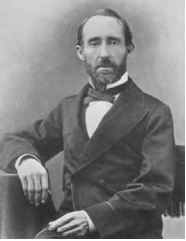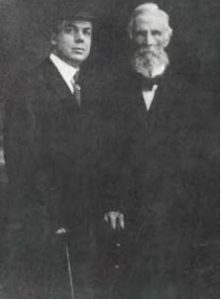ΘΔΧ FOUNDING FATHERS
In a plainly furnished back room of Union College (in the building then known as West College, a simple sturcture occupying the center of a square fronting Union Street, Schenectady, just south of the Centeral Railroad bridge over the Erie Canal) a party of six men met one May evening, and having quietly among themselves discussed friendship as a power, formed our fraternity, the ties of with now extend thoughout all countries and climates. – Memorial History, 1898, pp. 77-78.
These six men, all members of the class of 1849 at Union College, were Abel Beach, Theodore B. Brown, Andrew H. Green, William Hyslop, William G. Akin, and Samuel F. Wile.

William G. Akin – Akin was born on the 10th of February 1831 at Greenbush, New York, opposite Albany, where his father had a large farm. Broad shouldered and hazel-eyed, above average height, he entered Union in 1845 and while there sported a goatee. His gentlemanly manners and jolly disposition seemed to have made him a general favorite. He received an M.D. from New York Medical College in 1853. Going to Chicago in 1854, he encountered an outbreak of cholera. He immediately found himself pressed into service and worked very hard to alleviate the suffering. By the bedside of one of his patients, an old Albanian, he remained all night, and was much depressed over his failure to save his friend’s life. Exhausted, he fancied premonitions of cholera and took an overdose of preventive medicine, which brought on an attack of malarious fever, causing death on November 7, 1854. He is buried in the Albany Rural Cemetery. Brother Green remembered Brother Akin as “a very genial, pleasant companion and a very careful man in his contact, so far as all the essentials go, but he had a little of the Falstaffian character and I used to fear that his rashness would sometimes get him into trouble. But it never did, so far as I have ever heard, and I know that on some trying occasions he manifested a strength of character that was unexpected.”

Able Beach – Beach was born in Groton, New York, February 7, 1829, and enters the sophomore class at Union College in 1846. Of medium stature, fair complexion, hazel eyes, retiring and diggident in manner, he was known to possess a cheerful nature, with a merry laugh and a keen sense of humor. He was said to be a sincere friend and a pleasant companion. He taught school at Ithaca, East Virginia and Westfield Academies, all in New York State, and would have made teaching his porfession, but for his chronic bronchial trouble. After reading law in Buffalo he was admitted to the bar in 1853, and practiced in Ithaca for a year, then moved to Iowa City, Iowa, where he took the chair of Latin and Greek in the new University of Iowa. He served for four years as deputy auditor of the state, and was engaged for several years in the book and stationery business. After holding a position in the Pension Office in Washington, he returned to Iowa City, dying there on the 19th of June, 1899.
Theodore B. Brown – Brown was born in Stockbridge, Massachusetts, in 1828. Of a slender, delicate frame and medium height, with blue eyes and a fair complexion, he was described as a nervous, sensitive, and modest chap. He needed to be will known to be appreciated, but his friendship was heartfelt and embraced all with whom he was intimate. His first intention was to be a civil enfineer, but in 1850 he accepted an offer to teach school in Goldsboro, North Carolina. In 1856 he entered his father’s furniture business. At the breaking out of the War between the States his soul was listed in the Union cause, but his delicate constitution kept him out of the army. He gladly assumed the hom eduties of his brother that the family might have a representative in service. This extra effort to accomplish the work of two persons caused his death on August 13, 1864. He is buried in the beautiful Vale Cemetery in Schenectady, New York. Brother Green made the following remarks about Brother Brown at the Semi-Centennial Convention. “Brown was a fine mathematician, and a very excellent man, too, a warmhearted friend. He was exceedingly correct in his conduct. Ireally can remember him very well indeed.”

Andrew H. Green – Green was born in Utica, New York on February 5, 1830. After preparing at Utica Academy, he entered the sophomore class at Union in 1846. He was of medium height, erect and of florid complexion, genial, kind, and bright. He is described as a man socially inclined, but of high moral principles, suited to choose the right sort of companionship in the organization of Theta Delta Chi. After teaching school in Powhatan County, Virginia, he studied law and was admitted to the bar in 1851. In 1854 he accepted the job of Advocate of the U.S. Pacific Squadron, which took him on a two-year cruise through the Atlantic and Pacific. In 1856 he resigned his position and, after traveling through California, he returned to New York State to practce law until his retirement in 1905. He and his wife then spent eleven years in Detroit, returning to Hartford, New York in 1916. Elected to Phi Beta Kappa after graduation, Green was given an honorary degree by Union College in 1912. He died in 1918 and is buried in New Hartford.
His son, Andrew Heatley Green, Jr., was initiated into the Gamma Deuteron Charge (University
of Michigan) in 1917, becoming the only know realation of a founder to join Theta Delta Chi.
William Hyslop – Hyslop was born in 1829 and came from Rhineback, New York. He entered Union College in 1845, being tall, thin fellow, proud in bearing, conscientious, chilvarous, and of fine manners. Upon graduation he entered the College of Physicians and Surgeons in New York, from which he graduated with honors. He was house physician at Bellevue Hospital for a year, going thence to the Asylum on Blackwell’s Island for a year, as assistant physician. He finally engaged in private practice and died February 27, 1854, of typhoid fever. He is buried in the Greenwood Cemetery in Brooklyn, New York. Brother Green recalled, “Hyslop was the poet of the class. He was appointed valedictorian, and on the occasion I confess to you, gentlemen – and it is no impeachment of the character of Brother Hyslop – I was surprised. I did not know he was a poet, and, in fact, I think that was all the poetry he wrote during his college career. But he surprised me as much in the excellence of his production when it came out, for it drew great applause, and I never heard any unfavorable criticism.
Samuel F. Wile – Wile was born in 1829, at Pleasant Valley, New York. When in College he was spoken of as being small of stature, generous and kind, and a fair student. He studied medicine, but became tired of it and spent a year in business. Having bent for adventure, he finally shipped on a whaling vessel. Later he moved to New Zealand, and for twelve years was owner and captian of a vessel, trading along the coasts of Australia. In 1867 he returned to America and, after having spent a year in New York, went to Pineville, South Carolina, where he opened a store. When Dr. Porteus C. Gilbert, 2nd PGL, wrote to him in 1871, we was grateful to hear again of Theta Delta Chi, his distant and eventful life having dulled his memory. But at the sight of the names sent him as founders, he said that the countenances of all those college comrades came vividly enough to draw their portraits. He was very proud of his share in the origin of our fraternity and, perhaps anticipating an early death, expressed a desire that if any history of Theta Delta Chi were printed, a copy should be sent to his father. He died suddenly September 9, 1872. His grave is at St. Stephen’s Church near the railroad station of the same name. During the Semi-Centennial Convention, Brother Green made the following remarks about Brother Wile. “He was the only ‘wild’ one of the founders. I do not know how this can be accounted for, except perhaps that he was a clergyman’s son, and we know that clergymen’s sons are a little wild. He led an exciting life. I wish I could have sailed with him in the South Seas as he did for years. He died in South Carolina, and it was not until some years later that I heard of his death.”